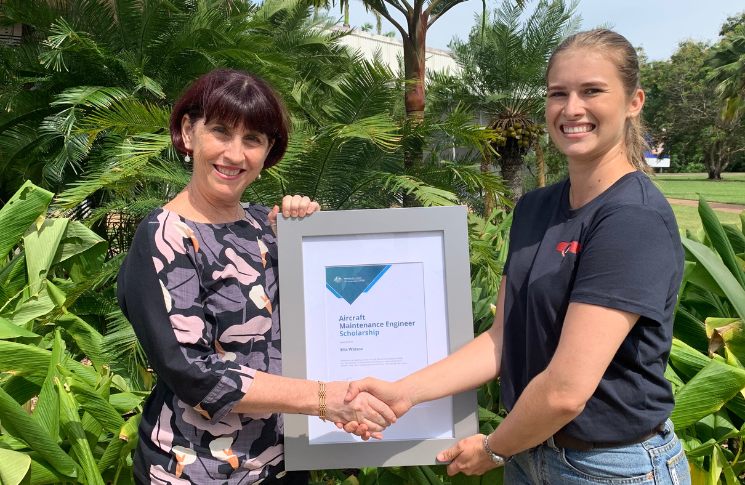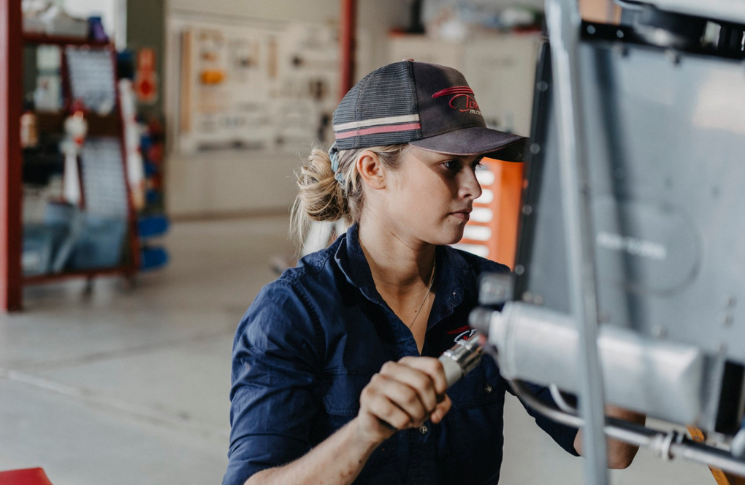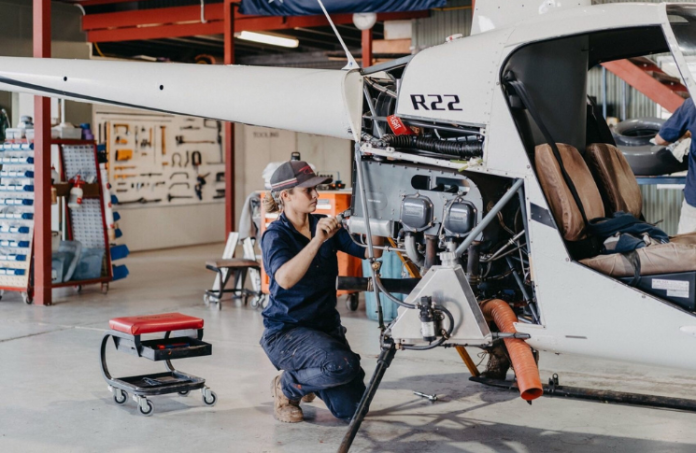Scholarship recipient Ella Watson reflects on her win
If you’ve ever been lucky enough to visit Fitzroy Crossing, the small town located in the Kimberley region of Western Australia, you’ll surely have been struck by its breathtaking natural beauty. The town serves as a gateway to several national parks and attractions, drawing tourists keen on exploring the region’s natural splendour and rich cultural heritage.
The area also boasts a thriving aviation industry, which helps ferries the many tourists and visitors around this remote corner of the Outback.
It’s also in this scenic locale, that former Sydneysider Ella Watson found her footing in the aviation industry. As the recipient of one of CASA’s aircraft maintenance engineer (AME) scholarships, she secured a ‘dream job’ with Kimberley Heli Maintenance – Helico.
Despite having no family history in aviation, Ella’s embraced her role as a Top End helicopter maintenance engineer with gusto and dedication.
‘Aviation wasn’t something I even knew much about before I began my apprenticeship,’ she explains.
‘I was always interested in mechanics and wasn’t sure which direction I wanted to go. My partner’s brother is an aircraft engineer and he offered me a week’s work placement in Kununurra with Northern Helicopter maintenance to see if I liked it – and I loved it.
‘So, I started studying with [training organisation] Aviation Australia at the beginning of the COVID pandemic in 2020, which was both good and bad in terms of travelling back to Perth for in-person classes.
‘Eventually I transferred to online learning and the teachers were really supportive. We created a great community within my class group, and I we still draw from each other a lot.
‘I’ve also got a good local network too. A lot of my engineering friends in Perth work on planes or turbine helicopters so it’s a great variety of people to know within the industry.’

Unique work location
Ella highlights the interesting challenges that come with working in remote locations such as Kununurra and Fitzroy Crossing but emphasises that the hands-on experience gained in such environments is worth the lack of city conveniences.
‘We fly into outback stations a lot and last year we actually did 2 aircraft recoveries,’ she says. ‘With one we had to take the helicopter apart, sling parts of it out and then put it on a truck and get it back to maintenance, which was I thought was a really cool experience.
‘I really love it because it just feels like it’s a big job, and it’s a challenge because you’re not in your normal work environment. There’s a lot planning that goes into it and thinking about how you’re going to execute the takedown. And then transporting the aircraft in a way that’s safe for us and safe for the aircraft too.
‘But there’s also constant ongoing pressure during the dry season because it is just go, go, go. It’s big hours and you’ve really got to be able to keep yourself switched on all the time and handle your fatigue.’
Engineer qualities
Even though she’s only a few years into her career, Ella acknowledges that attention to detail and patience are the key to becoming an aircraft engineer.
‘You also need to be really driven about your work because it can be so intense,’ she says. ‘Keep calm and collected and work through things as you usually would, no matter about the time pressure. It’s a really rewarding job. And it’s really inspiring too, and kind of fun as you’re always doing or learning something new.
‘Even engineers who I’ve worked with and been doing it for 10 years or more are always saying that they’re still learning.’
Despite the male-dominated nature of her industry, she has remained determined to advance and achieve her career aspirations as a female aviation engineer. With females only representing one per cent of AMEs in Australia, her persistence and dedication stand as a testament to breaking down barriers and paving the way for greater gender diversity in the field.
‘I was so worried when I first started out that I wouldn’t be taken seriously,’ she reflects, ‘but looking back now, it was just not like that for me.
‘And until recently I’ve almost always just worked with male engineers but now it’s myself and another female engineer at my workplace, which is great.’

AME scholarship effect
Ella’s journey shows the transformative impact that scholarships can have on students’ lives, providing not just financial aid but also the encouragement and motivation needed to excel in their chosen field.
‘I was over the moon,’ she laughs heartily, reflecting on the moment she received the news. ‘I wasn’t expecting it, and so when I got the call, I couldn’t believe it. It was unreal, and it has just been so helpful.’
This scholarship has provided Ella with invaluable financial support, allowing her to travel to Brisbane last year to complete many of her practical subjects.
‘It funded all of that,’ she says. ‘It’s also given me an awesome kind of leg up to finish things off, so, it really, really has been helpful to be able to get through to the last little bit of my studies.’
For now, Ella is focused on continuing to work with helicopters but doesn’t rule out travelling overseas to gain further experience. She’s also made the move Kimberley Heli Maintenance’s secondary base in Darwin.






Ella has embarked on a wonderful career. Hopefully other mechanically minded young women will be inspired by Ella’s success to take up the challenge to be an LME.